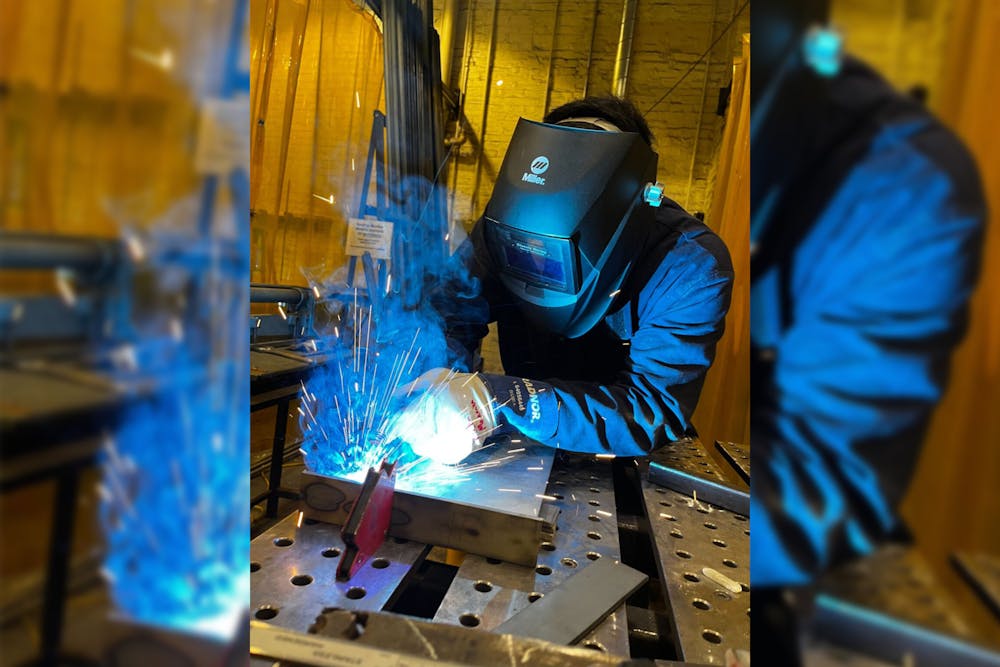
Penn Hyperloop, a student club focused on developing reusable tunnel-boring machines, won the Rookie of the Year award at this year’s The Boring Company competition finals.
The club competed in The Boring Company's global university competition in late March, which involved digging a 30-meter-long, half-meter-wide tunnel. Both the company and the competition were founded by Elon Musk, a 1997 College and Wharton graduate.
The group was established in 2023 by College and Engineering graduate Rishu Mohanka. Mohanka said he founded Penn Hyperloop with the aim of creating an environment at Penn that mimics the fast-paced style of companies such as SpaceX, where he previously interned.
School of Engineering and Applied Science sophomore Mehul Vemareddy who served as a project lead for the excavation system subteam said that he appreciated how much responsibility he was given on the project.
“We use a system called responsible engineers, and the idea is that it doesn't matter if you're a freshman, sophomore, junior or senior, or master's student. That doesn't dictate what your role is in the team, but rather the work that you put in and if you're able to deliver,” Vemareddy told the DP.
Vemareddy was initially only assigned to lead a subset of the mechanical engineering team, but due to the club’s unique way of rearranging responsibility and leadership based on performance, he was eventually promoted to lead the whole mechanical team.
“It was scary initially, when I felt that happening,” Vemareddy said. “I was averse to it, but then I realized that this is sort of the only way to grow quickly as an engineer.”
Engineering sophomore Tej Panigrahi served as propulsion system lead for the last year. Panigrahi designed the propulsion system for the machine top to bottom, which he found to be a great learning experience.
“Not only do you get to learn a lot, but you go at a faster pace. You're not waiting on someone else to get something done. You're in charge of removing all your blocks and getting to the end goal,” Panigrahi said. “It was challenging because it's a work environment not many people are used to, but it also was a lot of learning for myself and growing.”
The group has seen a 100% summer placement rate at one of Musk's companies. This year, the club raised $50,000 thousand in funds and received $70,000 thousand in sponsored parts.
First year MBA and Master of Arts in International Studies student Ilia Kozhelskii was drawn to the culture of the club, especially given his background in finance and business.
“I've always appreciated the work culture based on working very hard and working very quickly and efficiently and achieving results in a very short amount of time,” Kozhelskii said. “When I initially joined this team. I deeply resonated with this culture and with this work environment.”
Despite difficulties procuring a space at Penn, Penn Hyperloop negotiated an agreement for a space at a North Philadelphia makerspace facility. The team spent two months building their machine — a shorter timeframe compared to other teams at the competition.
“After classes, we were spending a lot of free time at that makerspace receiving the parts orders, as well, putting those parts together, welding them together, assembling different parts of the tunnel boring machine,” Kozhelskii said. “It was quite an interesting challenge.”
Twelve students from the team spent a full week in Texas, “living next to our machine and solving one problem after another until we finally completed a test dig” Kozhelskii said.
Kozhelskii says that the team typically worked from 8 a.m. until 2 a.m. in the days preparing the machine.
On the day of the competition, teams had eight hours to complete the dig and were judged based on the length of the tunnel that they managed to complete by the end of that time.
Kozhelskii says the team received the Rookie Award for several key achievements: building a fully functioning tunnel boring machine in record time with no safety issues, operating with the smallest team and budget, earning third place overall with a 1.2-meter tunnel, and being the fastest team to get their machine operational at the dig site.
“Things broke, but I was encouraged by how myself and my team were able to get into where we were digging and troubleshoot and fix those issues and continue mining,” Vemareddy said. “That was something that the company appreciated.”
“It's been extremely rewarding, and now I'm just looking forward to next year,” Vemareddy added.
The Daily Pennsylvanian is an independent, student-run newspaper. Please consider making a donation to support the coverage that shapes the University. Your generosity ensures a future of strong journalism at Penn.
Donate







